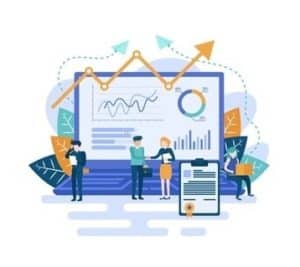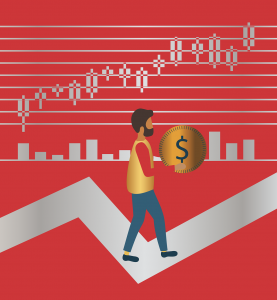Disclosure: Privacy Australia is community-supported. We may earn a commission when you buy a VPN through one of our links. Learn more.
Beginners Guide to Derivatives Trading in 2024

The first step you can towards derivatives trading is to make sure you know what derivatives are and what they are used for.
Derivatives themselves do not have a value. Instead, they are more of an agreement which says one party will owe the other party if a certain price is not paid by a certain date.
A derivative must be drawn up and agreed upon before anything is traded. This ensures you will not lose out on any money in the case that someone fails to pay you. Derivatives can be drawn up on anything including stock prices, interest rates, bond rates, commodity prices, and currency exchange rates.
Derivatives are a type of contract, they all have end dates that you need to keep in mind when trading.
For example, you might have a stock option that could move in price depending on how the stock is performing in the market. If you own Tesla stocks and the stock price goes down, the value of your call options will also go down.
You need to look at the expiration date of the contract, since the expiration date determines how hard you will get hit. So, if Tesla call options expire in January 2024 but the stock price continues to fall, you will not be hit as hard as if the calls expired in February.
Table of Contents:
- Types of Derivatives
- Futures Versus Options
- What are the Benefits of Derivative Trading
- Risks of Derivatives Trading
- Why Should I Use Derivatives for Trading
- How To Trade Derivatives
- What is the Point of Derivatives
- FAQs
Types of Derivatives ➡️
There are a few different types of derivatives that you should know about before getting started. Here are the most common ones to keep in mind when you begin trading.
CFDs
A Contract For Difference (CFD) allows you to speculate on the increase or decrease of many things within the market including commodities, currencies, shares, and indices. You can trade CFDs by just taking a contract, without needing to actually own the underlying asset.
You are not buying the asset, but rather speculating on whether you think the price of the asset is going to go up or down. You can trade CFDs on markets, which makes them a more attractive option than stocks for many people.
Futures ⏳️
One of the oldest and most common forms of derivatives is when it comes to trading is futures contracts. Futures can be purchased on many different things including interest rates, stock indices, and gold.
Oil futures are currently the most common, since oil prices are making headlines. When oil prices in contracts are negative, the supplier has to pay extra when they want their products unloaded.
Futures contracts have two different ways of being settled. There can either be a delivery of underlying assets or there can be a cash settlement.
Stock Options
Options are becoming more and more popular because retail traders are gaining access to them through free broker services like Webull and Robinhood.
Options are a contract based on the price of underlying stocks. Contracts have to be for a delivery of 100 shares. This means that option buyers are able to have large positions in the stocks of the company without putting in very much capital. This is known as having leverage, which is often a good thing.
There are some risks when it comes to leverage though. It’s mostly a risk when you do not know how the company or the shares work. For this reason, you need to make sure you are always doing your research before you put money into anything.
You can always seek the advice of a financial advisor if you are unsure about how it works or if you are not sure where to put your investment money.
Bonds
Bonds are designed to protect against everyday events like a rating downgrade. They have the potential to make you lots of money when used in certain ways, but most of the time they will only protect you from common events, which can still prove helpful in many cases.
One of the main risks when it comes to bonds is interest rate swaps. This most commonly happens when there is a sudden change in rates that cannot be controlled. Bonds’ futures contracts can also be traded on exchanges like the CME.
Commodities 🛒️
Keep in mind that, if you are able to trade something, you can almost always buy derivatives on it. Commodities futures are one of the most heavily traded items on the market and are gaining popularity.
While you might think of commodities as big-ticket items, there are a number of commodities you can have that are just everyday items like juice and soap. However, sometimes the commodities are much more expensive and include things like precious metals, cattle, and oil.
Currencies 💰️
Futures contracts can also be used with currencies. This mostly applies to companies that operate abroad and deal in foreign currencies. Futures contracts can protect them against exchange rates which can change every day and make it harder to operate a business in other countries.
Swaps
Swaps are over-the-counter contracts that have been customised. They are not traded by retail investors and are usually not traded over exchanges either. The most common type of swap is for interest rates. Swaps happen when two parties plan to exchange cash or liabilities in a set period of time.
Futures Versus Options 🔎️

Trying to understand the difference between Futures and Options can be extremely daunting. Once you see examples of each though, the difference becomes pretty clear.
Futures and Options both have the same purpose. They allow investors to lock in the prices of an investment before the trading process begins. This is extremely important because it allows the investors to protect themselves from certain trading risks like price fluctuations.
When you have a futures contract, the buyers must pay the agreed-upon price at a specific time. Alternatively, when you are using options, you have the choice to back out of the deal before the due date of the contract.
This makes a major difference between the two securities. With options, if the option you are investing in expires far away into the future, it will probably not have sufficient liquidity. Futures markets on the other hand are liquid and have narrow bid margins for spreads.
What are the Benefits of Derivative Trading? ✔️
After learning what derivatives are and how you can use them, you might wonder what the benefit is and whether you should bother trading them. There are many reasons to trade derivatives.
Here are some of the most common ones to keep in mind.
Hedging
Investors commonly use derivatives to hedge short and long-term positions in the security of their company. This includes buying options like SPY exchange-traded funds. People are more likely to do this when they want to gain security in volatile periods of stock trading.
Leverage Without Margin
A margin account can help you generate leverage. However, if you trade without a margin, it means that you cannot access funds from your broker to use in opening positions.
If you do not have access to margin, you can still add leverage to all your trades by using things like options and futures contracts. Remember that an option is a contract for 100 shares of the underlying stock. This means you will pay a low price but still be able to have a big position.
You will need enough capital to pay for the shares though, which can depend on what company you are buying shares into.
Price Guarantees 💵️
This works for companies that are exposed to commodities at risk. One of the most common examples is oil drillers. They use futures contracts to make sure they can lock in the oil price at the current rate and protect themselves against fluctuations.
This is also common with bond investors, as they like to use interest rate swaps to make sure they can lock in a rate of return. You can add this to investments to make sure your interest rate is kept constant.
When it comes to price guarantees, you can use derivatives along with your underlying assets to make the whole process smoother.
Risks of Derivatives Trading ✖️
Along with benefits, there are always risks in trading derivatives. Here are the risks to keep in mind before you move forward:
Time Decay ⏰️
All options and futures will have an expiration date. The contract value can expire and decay more quickly as the expiration date approaches.
No Intrinsic Value
Remember, all derivatives are contracts that are based on the price of an underlying asset. Derivatives themselves do not have their own value. So, the derivative has the potential to expire worthless if the agreed upon price is not reached before the expiry date.
Greater Risk Involved 🚩️
Investing in derivatives is considered riskier than investing in traditional assets. This is because with derivatives leverage and volatility are always increased.
When a stock you own declines by 10%, you will only lose 10% of your investment. However, when an option declines by 10%, you could even lose up to half of the same stock, depending on the new price and the expiration date.
More Complex
Derivatives require more complex ways of pricing because the calculation has to include several things, including underlying asset prices and the time you have until it expires. The formula for calculating the price also needs to include the rate of change and the volatility.
Trying to figure out these formulas on your own can be confusing and overwhelming. That’s why most people employ professional help to make sure they get the right information and correct numbers.
Why Should I Use Derivatives for Trading? 📊️
There are many reasons why you might want to trade derivatives. Here are the key reasons people look into trading derivatives.
Hedging
For most traders, derivatives are the number one way to hedge investments, as it adds security. Most of the time, when an investor adds hedging when they are investing in something potentially risky like an oil drilling firm.
Setting up an oil drilling firm is a lengthy process, complicated by many factors from determining the location to drill to setting up for the drilling processes.
Oil drillers often buy future oil futures contracts so the price of the oil they hopefully find is locked in and they do not need to worry about fluctuations. This means the company can protect its revenue iby cashing in the contracts when the time comes.
Speculation 🤔️
Derivatives can also be used to place bets on things you think might gain value in the future. Most of the time, options are used to bet on tech stocks or stocks, like far out-of-the-money and GameStop.
The exact stocks that are currently the subject of speculation vary over time. You can always wait and see what the season has in store before choosing which stocks you want to speculate on.
Leverage ⚖️
Leverage can be dangerous and should only be used with care. When you trade derivatives, you are making your share of the company larger but you are not actually investing any more capital. If the stock ends up being worth more than the strike price before your derivative expires, you will make gains. However, this is also the risk that comes with derivatives. If the value falls below the strike price, you could lose out big.
How To Trade Derivatives

Derivatives are not priced the same as stocks. Since they are processed differently, they are also traded with different exchanges. There are two main types of derivative exchanges:
- Over the Counter (OTC)- OTC trades have no authority figure that is central to the rules. This means you are trading outside the normal guidelines. This is how people get access to securities that are not usually available in more regulated exchanges. It’s completely legal to do it this way, but the risks do increase.
- Regulated Exchanges- This kind of trading takes place just like regulated exchanges in stocks. Trades are all governed by the regulator and can only take place under certain rules. These types of trades are much less risky but they often mean you get fewer rewards as well.
What is the Point of Derivatives? 👀️
Derivatives were first designed to help investors eliminate exchange rate risks. They are used for more than just that nowadays though. They are now mostly used to help investors invest their money without taking too much risk, offering them more investment opportunities.
Derivatives are an attractive option, used by investors all over the world, because it offers them exposure to all the different price changes in the market without needing to actually own things.
Derivatives serve many different functions for your portfolio. They make your portfolio much more diverse, plus you also get a better platform for speculating on price changes. This allows investors to take advantage of a much broader range of investment opportunities.
One of the best ways to use derivatives is to profit from financial assets that you might decided not to invest in directly.
For example, many people have trouble understanding the ins and outs of cryptocurrency, so they decide not to invest in it. Instead, they can buy a derivative which allows them to earn profits when a cryptocurrency rises, without needing to own any of that cryptocurrency. They can also trade currency derivatives which help them gain leverage in the market.
Leverage is useful for a few different reasons. It is important for those investors who want to increase their capital holdings and make larger profits when they make successful trades. Leverage can also make losses worse though, which is why you should always use leverage very carefully.
The structure of derivatives is also important because it’s very different to simply investing in stocks or another type of investment.
Derivatives can help you take advantage of the arbitrage opportunities in the market as well. This includes similar financial assets being priced at different rates at the same time but on different platforms.
Trading derivatives is also important because it allows you to purchase derivatives that are moving in a different direction from the asset that you own.
For example, many people who own Microsoft shares might want to buy a derivative based on the Microsoft share price. A call option gives them the right to buy Microsoft shares, which they might purchase if they expect that the price of the asset is going to rise. A put option gives them the right to sell Microsoft shares, which they might purchase if they expect the price is going to fall.
Frequently Asked Questions ➡️
What Kinds of Markets Have Financial Derivatives?
There are many different kinds of derivative markets, just like there are many different types of derivatives. Most derivatives come from things like commodities, currencies, or even equities.
There are other kinds of markets that use derivatives including short-term debt markets, over-the-counter lending markets, credit risk markets, and government bond markets.
What Are the Most Common Types of Financial Derivatives?
The most common type of financial derivatives is futures contracts. This is an agreement on a future financial transaction, with a set date and set price.
Whoever holds the contract has the right to use the financial derivative, but they are not obligated to use it if it doesn’t suit them, which is what makes derivatives so attractive to investors. You can also take the derivative and purchase or sell the according asset at any time in the future.
You will also have a CFD which allows for an exchange of the difference in the value of an asset. You have from the time the contract is opened to the time it’s closed and you do not need to spend any time owning the underlying asset, which is why so many people prefer derivatives.
How Can I Use Financial Derivatives?
There are many different ways you can use financial derivatives. They should mostly be used when you want to manage the amount of risk you have in a financial trade. A common example is when you are in the futures market and farmers are trying to sell their futures, so that they can lock in a good price for the grain and livestock.
This is one common way for them to reduce risk when it comes to needing to sell their things and make enough profits to make a living.
People also use financial derivatives when it comes to needing CFD products for trading. CFDs can be leveraged and can be used to magnify trading results when there is more than one asset for sale.
Final Thoughts

If it’s your first time investing and you want to look into using derivatives, there are many choices. Using this guide, you can get all the information you need before investing. Derivatives are often a less risky choice since you do not actually need to buy the asset.
You also have space to make speculation bids if you think you know whether the price is going to move up or down. Overall, financial derivatives are a good choice for investors.
You Might Also Like:






